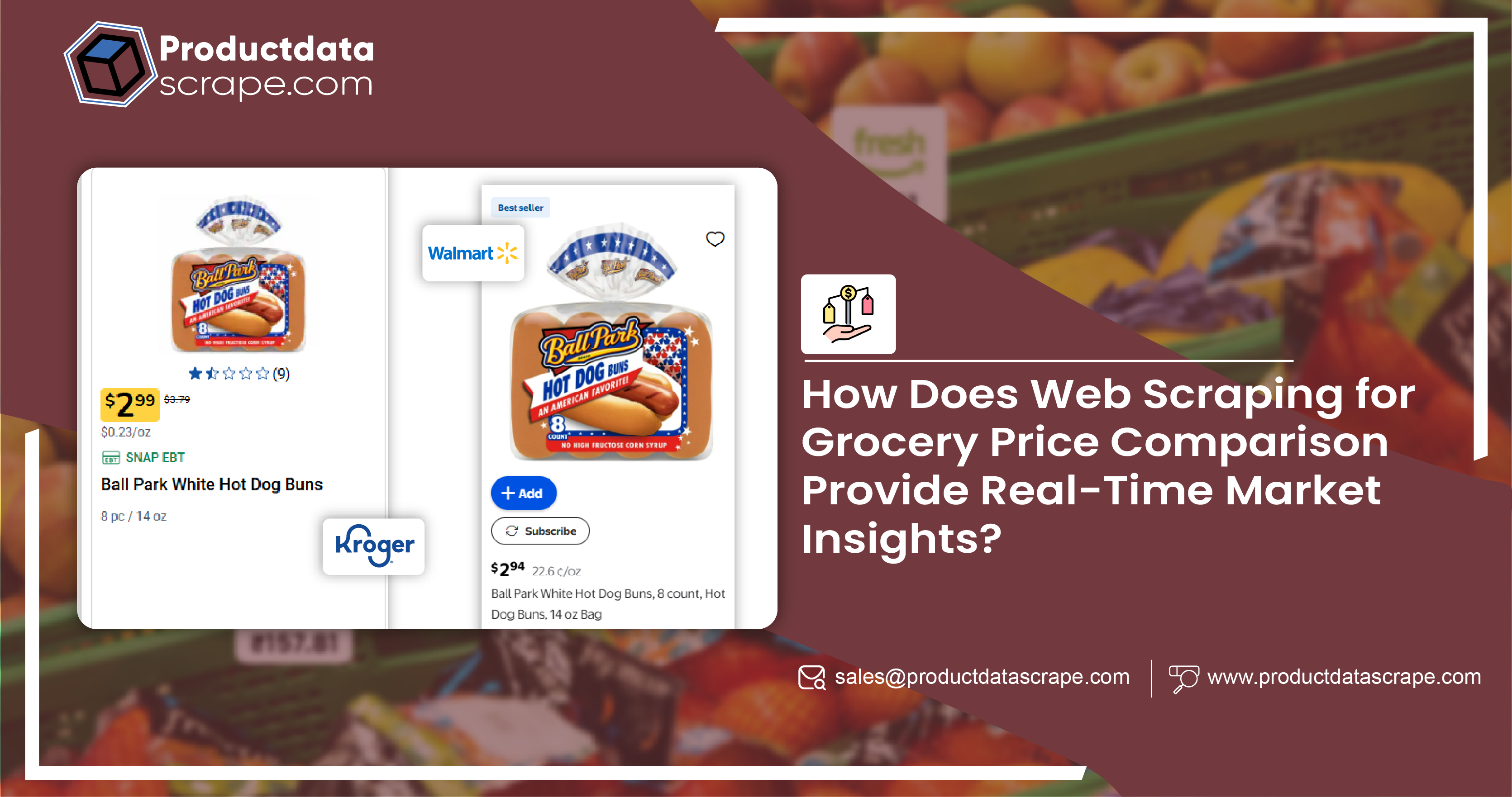
Introduction
In today’s digital world, web scraping for grocery price comparison has become a game-changer for consumers looking to save money on essential goods. With inflation and fluctuating prices, manually checking multiple grocery platforms for the best deals is time-consuming and inefficient. Real-time web scraping for online grocery stores allows users to extract up-to-date pricing data, helping them compare prices effortlessly and make informed purchasing decisions.
By leveraging real-time competitor price scraping, shoppers can track discounts, promotions, and price fluctuations across various retailers, ensuring they get the best value for their money. At the same time, businesses and e-commerce platforms can analyze competitor pricing strategies, identify market trends, and optimize their pricing models accordingly. This data-driven approach benefits consumers and retailers, fostering a competitive marketplace while enhancing overall shopping efficiency. As online grocery shopping grows, automated price tracking will play an increasingly vital role in innovative spending strategies.
The Growing Importance of Grocery Price Comparison
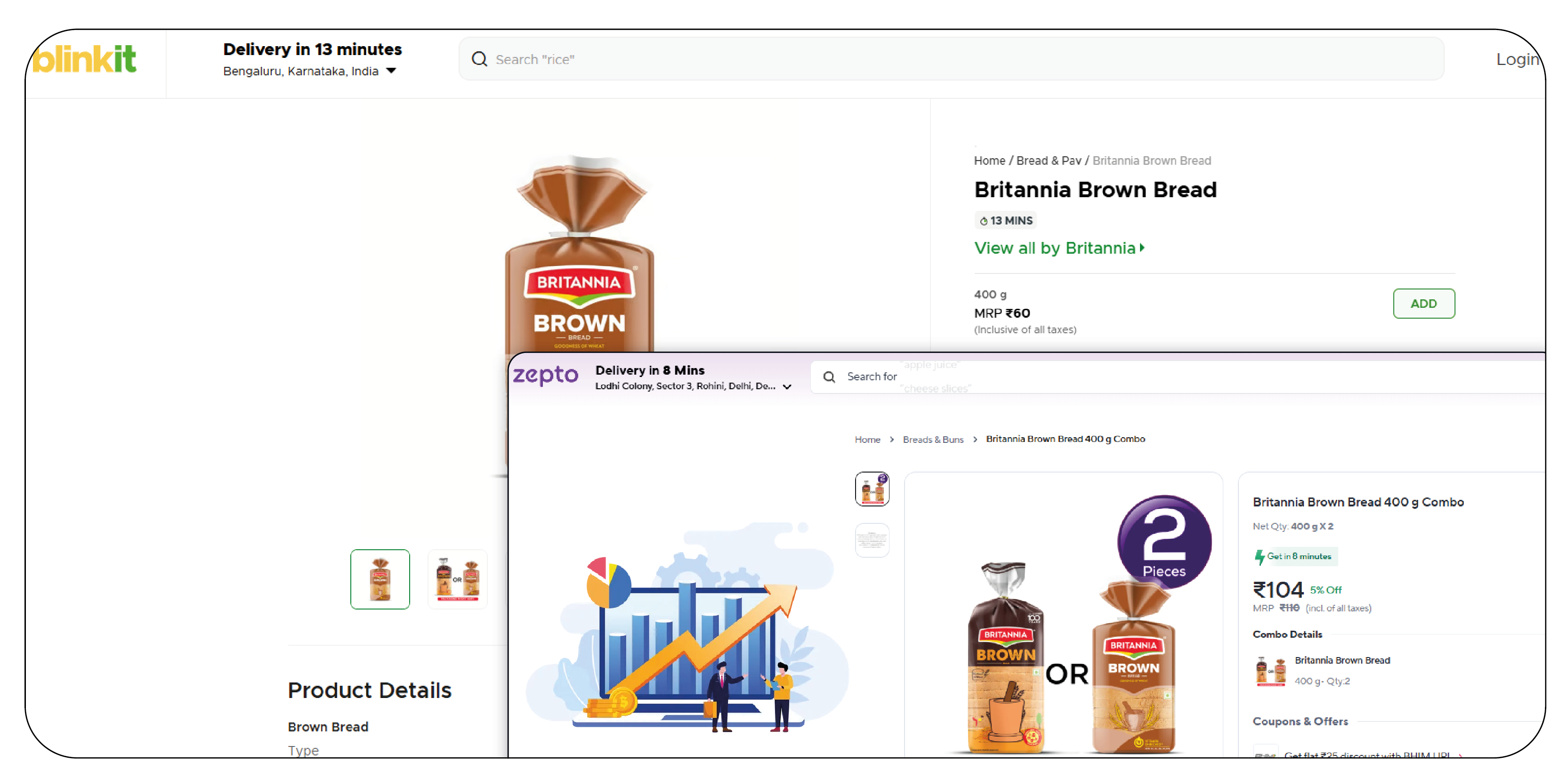
Grocery prices fluctuate constantly due to factors like supply chain disruptions, seasonal demand, and economic conditions. For consumers, finding the best deals requires access to updated pricing across multiple platforms. Using technology to scrape online grocery prices in real time helps shoppers compare costs efficiently and make informed purchasing decisions.
Retailers gain a competitive edge by leveraging real-time grocery pricing intelligence with web scraping. This allows them to monitor competitor prices and adjust their strategies to attract more customers. This data-driven approach enhances pricing optimization and ensures better market positioning.
Businesses in grocery e-commerce, meal-kit services, and price comparison websites rely on extracting grocery product data for market analysis to improve customer experience and boost sales. Structured pricing insights enable them to track trends, predict demand, and refine marketing efforts. As online grocery shopping expands, accurate real-time pricing intelligence becomes essential for consumers and businesses.
What is Web Scraping and How Does it Help in Grocery Price Comparison?
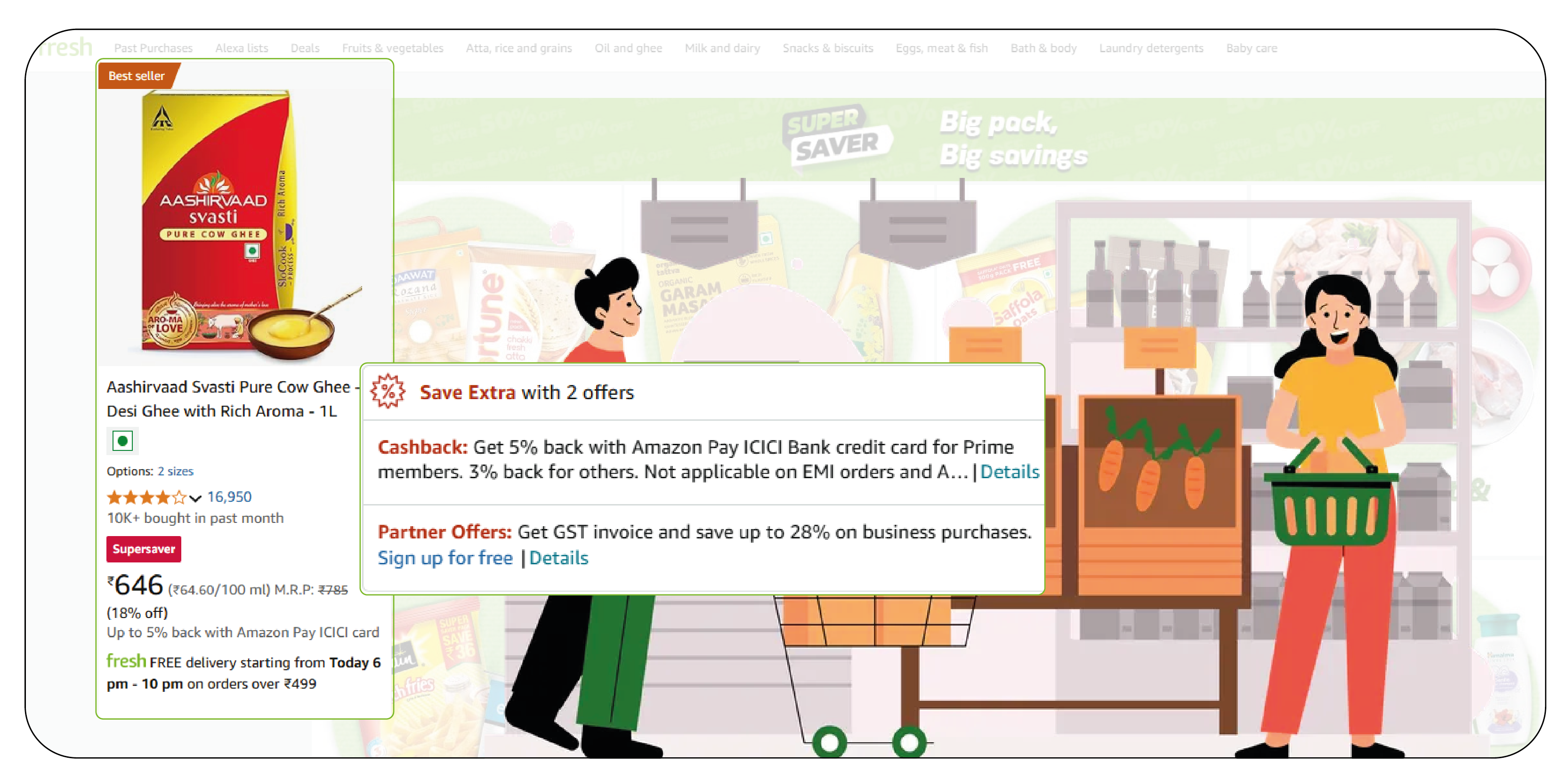
Web scraping is using automated bots or scripts to extract data from websites. In the context of grocery price comparison, web scraping tools collect pricing, product details, promotions, and discounts from multiple online stores. The extracted data is processed, cleaned, and analyzed to provide meaningful insights.
With web scraping, users can:
- Access real-time grocery prices from multiple sources
- Compare prices of similar products across different stores
- Identify the best deals, discounts, and promotions
- Analyze historical pricing trends to predict future fluctuations
- Optimize budget planning and shopping decisions
- Enhance market research for grocery retailers and suppliers
Benefits of Web Scraping for Grocery Price Comparison
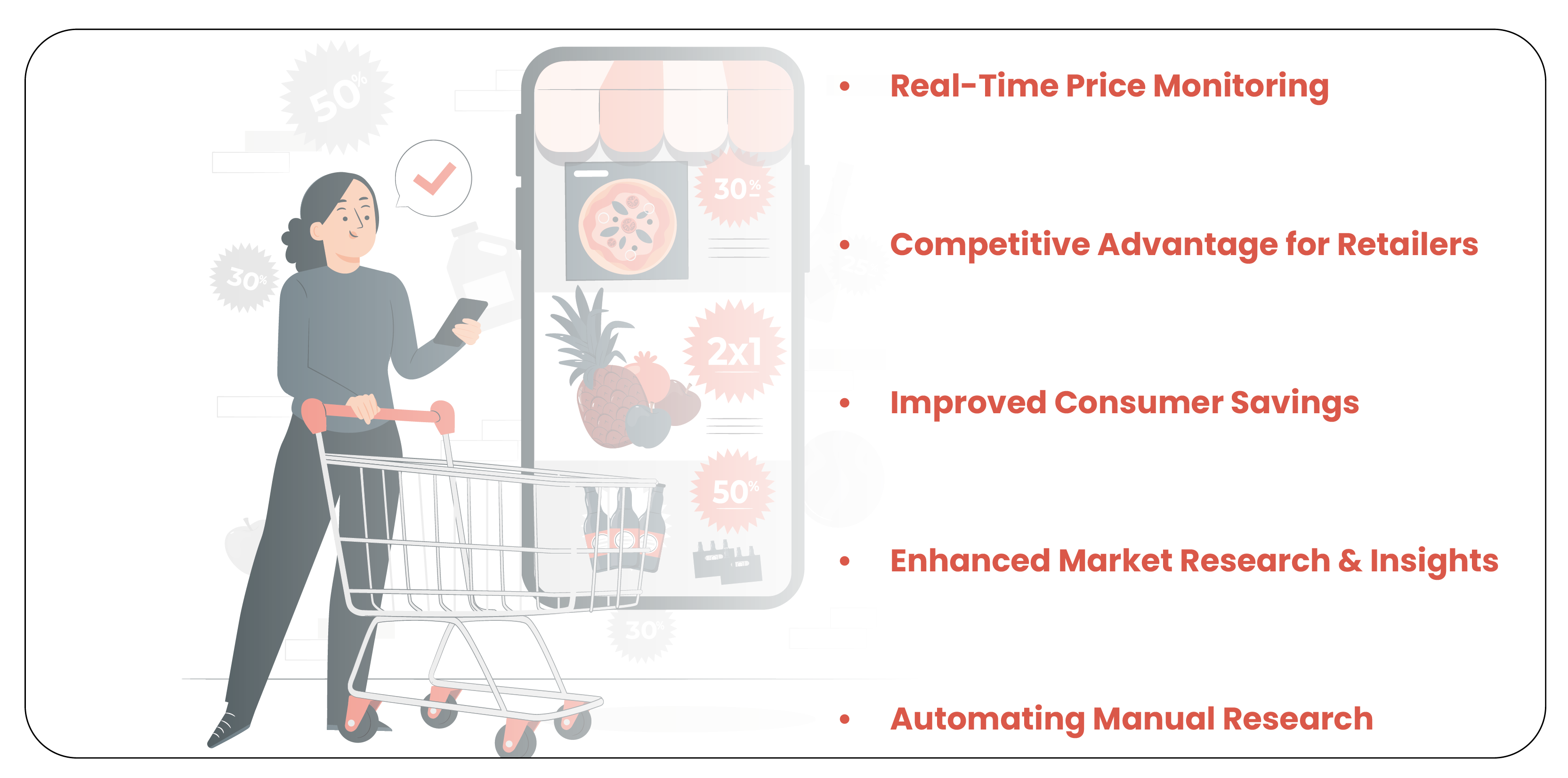
Web scraping revolutionizes grocery price comparison by providing real-time pricing insights across multiple platforms. It helps consumers save money, enables retailers to stay competitive, and supports businesses with market research. Automated data extraction ensures accurate, up-to-date pricing for smarter shopping and strategic decision-making.
- Real-Time Price Monitoring: Grocery prices fluctuate due to stock availability, promotions, and shifting demand. Web scraping for grocery product availability ensures consumers and businesses receive the latest price updates, helping them make timely purchasing decisions. Real-time tracking lets shoppers stock up on essentials when prices are low, preventing unnecessary expenses.
- Competitive Advantage for Retailers: Online grocery retailers face intense competition. By scraping grocery price data, businesses can track competitor pricing, identify gaps, and refine pricing strategies. This approach helps retailers stay competitive while maximizing profits.
- Improved Consumer Savings: Consumers can significantly cut grocery expenses by comparing prices across multiple platforms. By utilizing Grocery Dataset insights, shoppers can identify cost-effective alternatives, track discount periods, and optimize shopping lists based on price trends.
- Enhanced Market Research & Insights: For in-depth market research, e-commerce platforms, suppliers, and marketing agencies benefit from extracting grocery & gourmet food data. Analyzing historical trends, demand patterns, and promotions allows businesses to refine their pricing policies and marketing strategies.
- Automating Manual Research: Manually comparing grocery prices is time-consuming and prone to errors. Web scraping grocery & gourmet food data automates this process, saving time while ensuring accurate, structured pricing insights for consumers and businesses.
Challenges in Web Scraping for Grocery Price Comparison
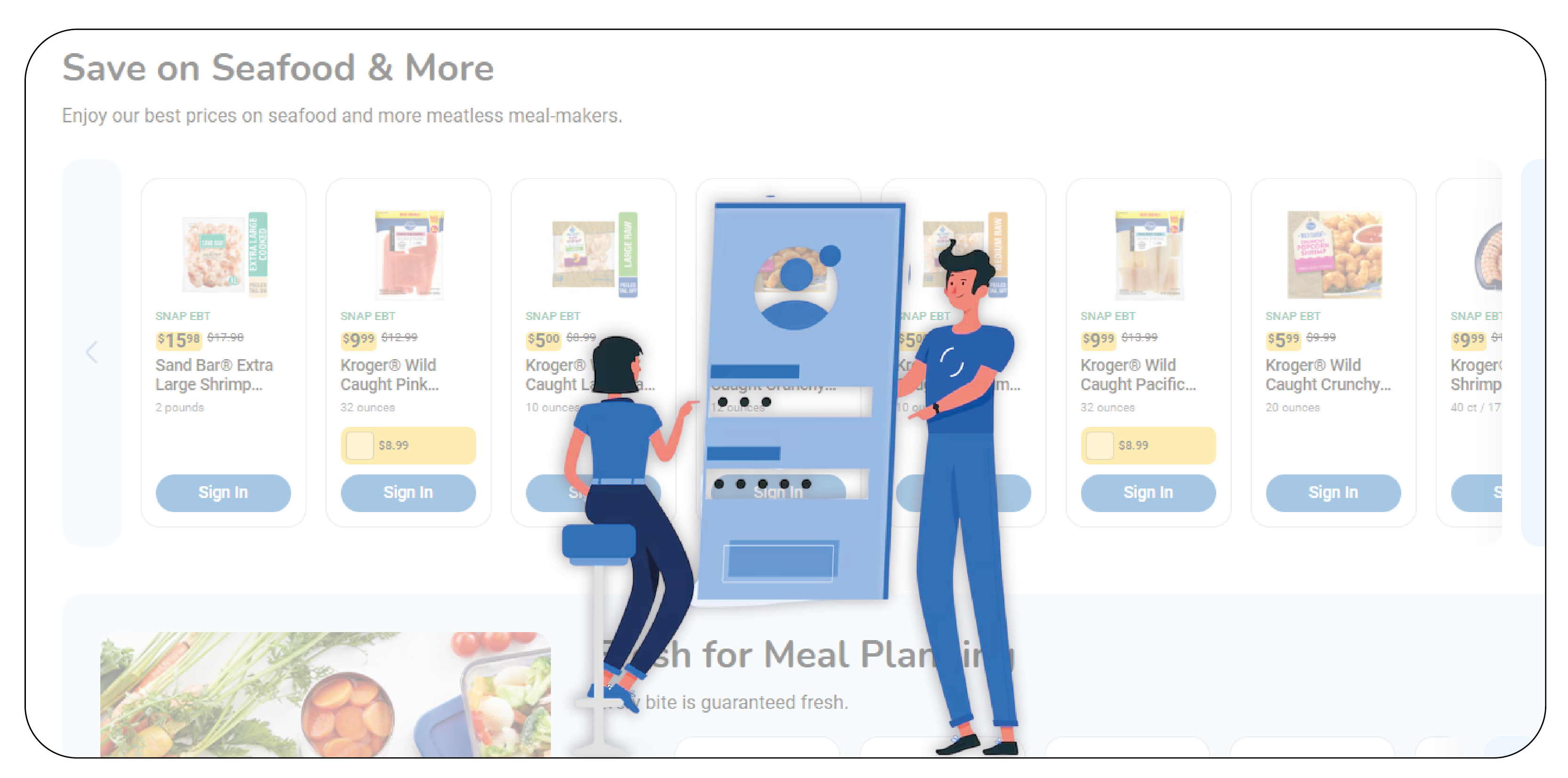
While web scraping offers immense benefits, it comes with specific challenges. Here are some common obstacles and potential solutions:
- Website Structure Changes: Many online grocery platforms frequently update their website structures, affecting data extraction scripts. Using AI-powered or adaptable scraping tools can help overcome this issue by dynamically adjusting to website changes.
- Anti-Scraping Measures: E-commerce websites often employ anti-scraping mechanisms such as CAPTCHA, IP blocking, and rate-limiting. Businesses mitigate these challenges by using rotating proxies, headless browsers, and ethical scraping techniques.
- Data Accuracy and Cleaning: Raw scraped data may contain inconsistencies, duplicates, or missing values. Implementing data validation techniques ensures the extracted information is accurate and usable for price comparison.
- Legal and Ethical Considerations: Web scraping must comply with legal frameworks, including website terms of service and data protection regulations. Ethical scraping practices, such as using public APIs where available and avoiding excessive server requests, ensure compliance with legal guidelines.
Applications of Web Scraping in Grocery Price Analysis
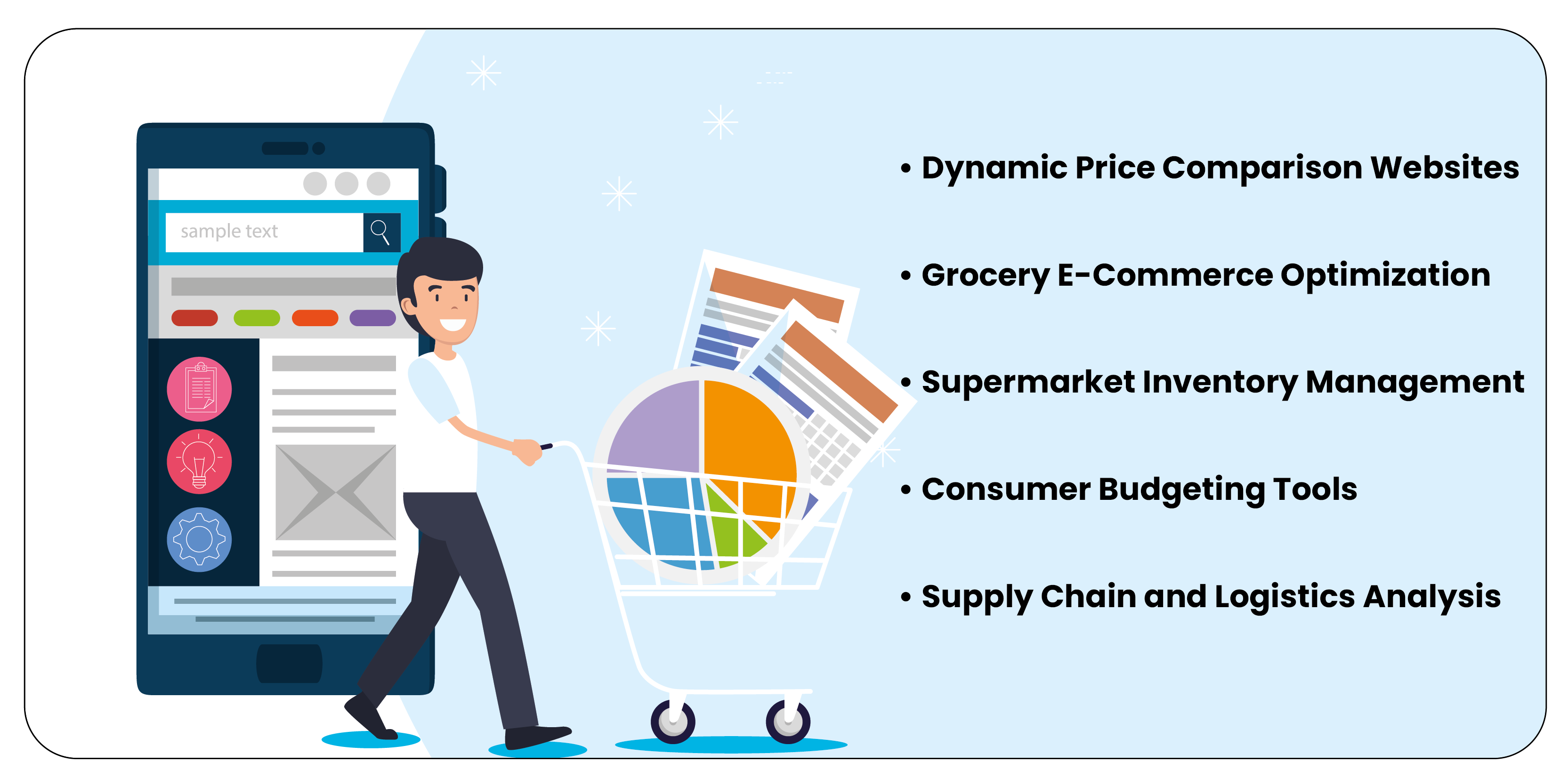
Web scraping plays a crucial role in grocery price analysis by collecting real-time pricing data from multiple retailers. It helps businesses track price fluctuations, analyze market trends, optimize pricing strategies, and enhance competitive intelligence for better decision-making in the grocery industry.
- Dynamic Price Comparison Websites: Price comparison platforms use web scraping to display the latest grocery prices from various retailers. Consumers can easily compare prices, find the best deals, and make informed purchasing decisions.
- Grocery E-Commerce Optimization: Online grocery businesses leverage scraped data to adjust pricing strategies, optimize product listings, and enhance their competitive positioning.
- Supermarket Inventory Management: Retailers use web scraping to track stock availability, monitor demand trends, and optimize inventory levels to prevent overstocking or shortages.
- Consumer Budgeting Tools: Budgeting apps integrate web scraping to help consumers plan grocery expenses by tracking price fluctuations and recommending cost-effective shopping strategies.
- Supply Chain and Logistics Analysis: Distributors and suppliers use scraped data to monitor pricing trends, assess regional demand, and optimize logistics strategies for grocery distribution.
Future Trends in Grocery Price Comparison Using Web Scraping
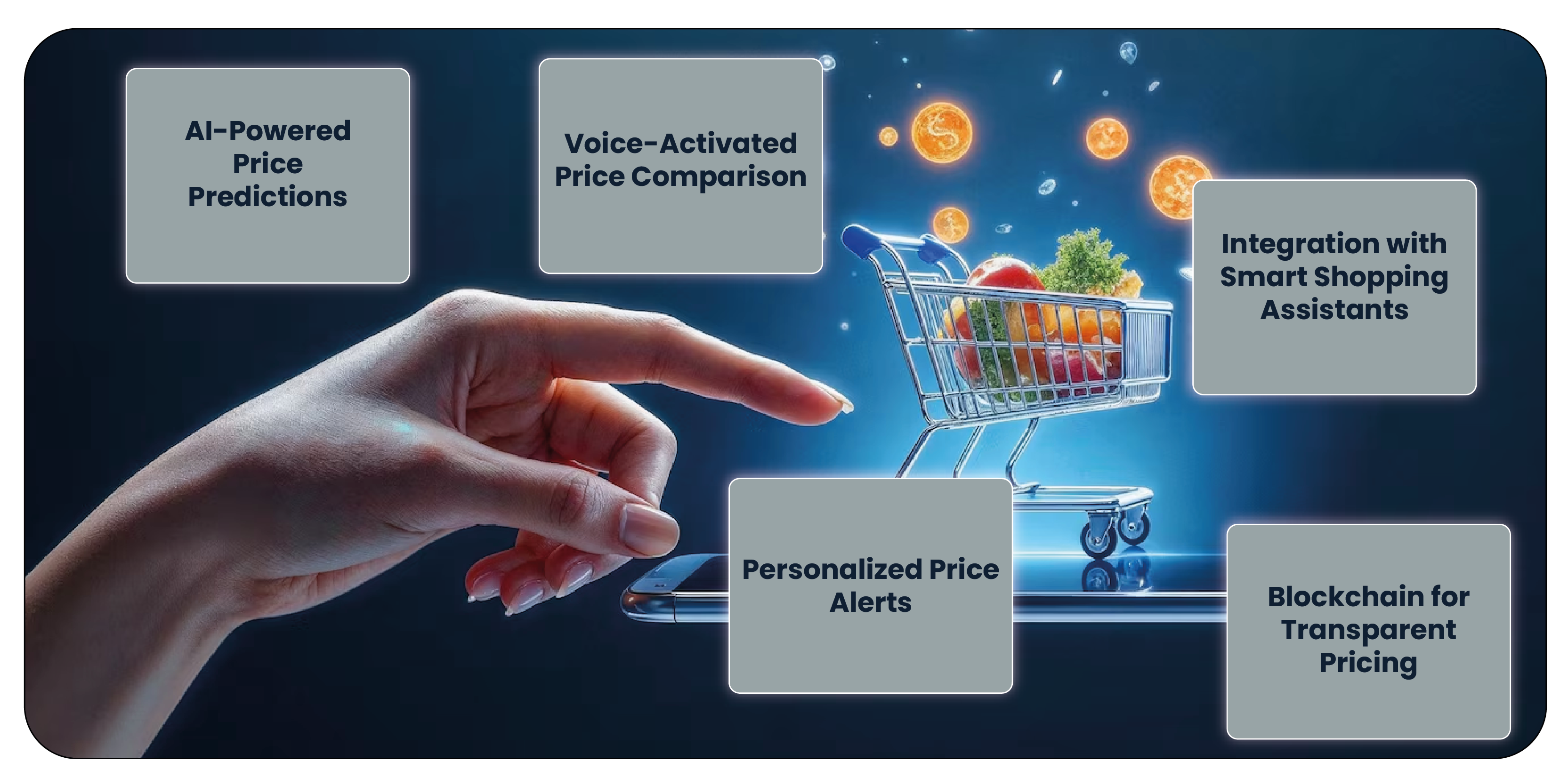
Advancements in AI, machine learning, and big data analytics will shape the future of grocery price comparison. Here are some emerging trends:
- AI-Powered Price Predictions: Machine learning algorithms will enhance price forecasting capabilities, allowing consumers and businesses to anticipate fluctuations and plan purchases accordingly.
- Voice-Activated Price Comparison: With the rise of voice assistants, web scraping will integrate with voice search technology, enabling users to compare grocery prices using voice commands.
- Personalized Price Alerts: AI-driven price tracking tools will offer personalized price alerts, notifying users when their preferred grocery items are available at the lowest prices.
- Blockchain for Transparent Pricing: Blockchain technology may be integrated into grocery price comparison tools to enhance the transparency, authenticity, and reliability of pricing data.
- Integration with Smart Shopping Assistants: IoT-enabled intelligent shopping assistants will use web scraping to suggest grocery purchases based on user preferences, budgets, and real-time price comparisons.
How Product Data Scrape Can Help You?
Automated Grocery Data Scraping – Our cutting-edge technology extracts real-time grocery prices, product details, and stock availability from various online platforms.
Multi-Platform Data Collection – We gather data from multiple grocery websites, apps, and marketplaces, ensuring comprehensive price comparison and market analysis coverage.
High-Accuracy Data Processing – Our advanced algorithms filter, clean, and structure the collected data, eliminating errors and inconsistencies for precise insights.
Competitor & Trend Analysis – We help businesses track pricing strategies, promotional patterns, and demand fluctuations, enabling smarter pricing and marketing decisions.
Customizable & Scalable Solutions – Whether for a small retailer or a large enterprise, our data services can be tailored and scaled to efficiently meet specific business needs.
Conclusion
Web scraping for grocery price comparison revolutionizes how consumers and businesses interact with pricing data. By automating the extraction of real-time grocery prices from multiple sources, web scraping enables smarter shopping decisions, competitive business strategies, and enhanced market insights.
Despite challenges such as website changes, anti-scraping measures, and legal considerations, advancements in AI and ethical scraping techniques continue to drive innovation in this space. As technology evolves, web scraping will play an increasingly vital role in shaping the future of grocery shopping, ensuring consumers get the best deals. At the same time, businesses stay ahead in the competitive retail landscape.
By effectively leveraging web scraping tools, shoppers can save money, businesses can optimize pricing strategies, and the grocery industry can experience data-driven transformation for greater efficiency and success.
At Product Data Scrape, we strongly emphasize ethical practices across all our services, including Competitor Price Monitoring and Mobile App Data Scraping. Our commitment to transparency and integrity is at the heart of everything we do. With a global presence and a focus on personalized solutions, we aim to exceed client expectations and drive success in data analytics. Our dedication to ethical principles ensures that our operations are both responsible and effective.







































.webp)




.webp)
.webp)
.webp)